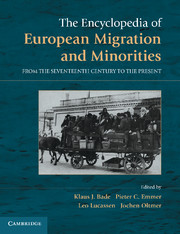Book contents
- Frontmatter
- Contents
- Preface to the English Edition
- Preface to the German Edition
- The Encyclopedia: Idea, Concept, Realization
- Terminologies and Concepts of Migration Research
- Countries
- Northern Europe
- Western Europe
- Central Europe
- Southern Europe
- East-Central Europe
- The Baltic Region: Estonia, Latvia, Lithuania
- Poland
- Czechia and Slovakia
- Southeastern Europe
- Eastern Europe
- APPENDIX
- Index of Migration Types
- Index of Countries, Regions, and Places
- References
The Baltic Region: Estonia, Latvia, Lithuania
from East-Central Europe
Published online by Cambridge University Press: 05 June 2012
- Frontmatter
- Contents
- Preface to the English Edition
- Preface to the German Edition
- The Encyclopedia: Idea, Concept, Realization
- Terminologies and Concepts of Migration Research
- Countries
- Northern Europe
- Western Europe
- Central Europe
- Southern Europe
- East-Central Europe
- The Baltic Region: Estonia, Latvia, Lithuania
- Poland
- Czechia and Slovakia
- Southeastern Europe
- Eastern Europe
- APPENDIX
- Index of Migration Types
- Index of Countries, Regions, and Places
- References
Summary
Migrations occurred in the Baltic regions in various forms from the early modern period on, reaching their largest scale during and immediately after World War II. Germans immigrated on a regular basis beginning as early as the 16th/17th centuries. In the 19th century, the direction of the movement reversed: at first individuals of German extraction left, then larger and larger groups. Added to this were internal migrations by the native population triggered by industrialization, the first group emigrations to Russia, and overseas mass migration, especially from Lithuania to North America. Streams of refugees and deportations in the course of the revolutions and wars of the 20th century intensified these geographic population movements and led, along with the political upheavals, to a fundamental shift in the composition of the population. As shifts in regional and supraregional political power repeatedly redefined the role of majorities and minorities, the most diverse integrations had to be managed in the Baltic region.
The region and its boundaries
It is only in recent times that the Baltic area has been seen as a uniform entity, since Estonia, Latvia, and Lithuania embarked on a similar path of development after the end of World War I, at the earliest – both as independent states and during occupation by foreign powers. Following the union of 1569, Lithuania was increasingly drawn into Poland’s sphere of influence. It was incorporated into the three partitions of Poland at the end of the 18th century (1771, 1793, 1795) and thus came under Russian rule. By contrast, Estonia and Livonia preserved their corporative privileges during the Great Nordic War (1700–21) with the Capitulation of 1710, reaffirmed in terms of international law in the Peace of Nystad in 1721. That was also true of the Duchy of Courland in 1795, which previously had been under Polish feudal suzerainty. The German-Baltic knightly estates, along with the groups of clergy and townsmen that were reinforced by continuous immigration from Germany, constituted the political, economic, social, and cultural elite, while the majority of the Estonian and Latvian peasants had no part in the political leadership of the state and fell into growing social and economic dependency. While a larger influx of German peasants did not take place, learned individuals had been joining the Baltic Literatenstand (estate of men of letters) ever since the Enlightenment; the migration of czarist officials, meanwhile, remained limited. On the other hand, many German Balts, especially in the 19th century, took advantage of the opportunities in the Czarist Empire to pursue careers as military officers, civil servants, or scholars.
- Type
- Chapter
- Information
- The Encyclopedia of European Migration and MinoritiesFrom the Seventeenth Century to the Present, pp. 133 - 142Publisher: Cambridge University PressPrint publication year: 2011



